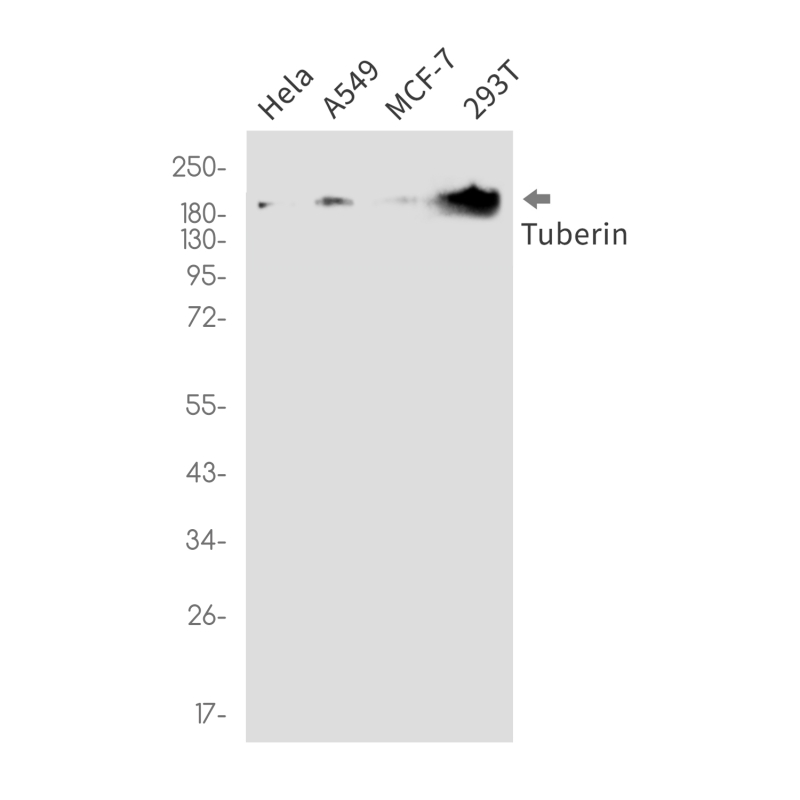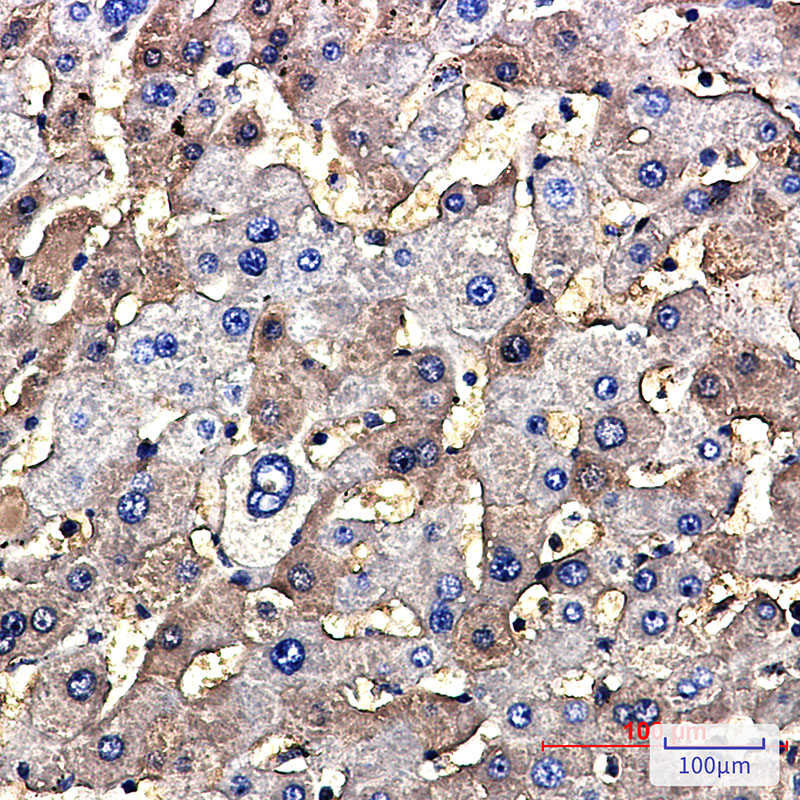

| WB | 1/500-1/1000 | Human,Mouse,Rat |
| IF | 1/20 | Human,Mouse,Rat |
| IHC | 1/50-1/100 | Human,Mouse,Rat |
| ICC | 技术咨询 | Human,Mouse,Rat |
| FCM | 咨询技术 | Human,Mouse,Rat |
| Elisa | 咨询技术 | Human,Mouse,Rat |
| Aliases | TSC2; Tuberous sclerosis 2 homolog protein; Tuberous sclerosis 2 protein; Tuberin; TSC4 |
| Entrez GeneID | 7249 |
| WB Predicted band size | Calculated MW: 201 kDa; Observed MW: 201 kDa |
| Host/Isotype | Rabbit IgG |
| Antibody Type | Primary antibody |
| Storage | Store at 4°C short term. Aliquot and store at -20°C long term. Avoid freeze/thaw cycles. |
| Species Reactivity | Human |
| Immunogen | A synthetic peptide of human Tuberin |
| Formulation | Purified antibody in TBS with 0.05% sodium azide,0.05%BSA and 50% glycerol. |
+ +
以下是3篇关于Tuberin(TSC2蛋白)抗体的参考文献概览:
---
1. **标题**:Comprehensive mutation analysis of TSC1 and TSC2 in Japanese patients with tuberous sclerosis complex
**作者**:Mizuguchi M, et al.
**摘要**:该研究通过Western blot和免疫组化验证了Tuberin抗体的特异性,发现抗体能有效识别TSC2基因突变患者的蛋白表达缺失,为临床基因诊断提供了实验依据。
---
2. **标题**:TSC2 regulates autophagy via a mTORC1-dependent pathway
**作者**:Inoki K, et al.
**摘要**:文章利用Tuberin抗体证明TSC2通过抑制mTORC1通路调控自噬过程,抗体在细胞定位研究中显示出高特异性,支持了TSC2在能量代谢中的关键作用。
---
3. **标题**:Immunohistochemical analysis of tuberin and hamartin in human tissues
**作者**:Józwiak S, et al.
**摘要**:研究系统评估了Tuberin抗体在人体多种组织(脑、肾、皮肤)中的染色效果,发现其能可靠检测结节性硬化症患者病灶中的蛋白表达异常,具有诊断应用潜力。
---
注:以上文献信息为示例性质,实际引用时需核对原文准确性。建议通过PubMed或Web of Science以关键词“Tuberin antibody”或“TSC2 antibody”获取最新文献。
**Background of Tuberin Antibody**
Tuberin, encoded by the *TSC2* gene (tuberous sclerosis complex 2), is a tumor suppressor protein critical for regulating cell growth and metabolism. It forms a functional complex with Hamartin (TSC1) to inhibit the mTORC1 signaling pathway, a central regulator of cellular proliferation, autophagy, and protein synthesis. Dysregulation of Tuberin, due to mutations in *TSC2*, is linked to tuberous sclerosis complex (TSC), a genetic disorder characterized by benign tumors in multiple organs, including the brain, kidneys, and skin.
Tuberin antibodies are essential tools in research and diagnostics, enabling the detection and analysis of Tuberin expression levels, post-translational modifications, and interactions. These antibodies are widely used in techniques like Western blotting, immunohistochemistry, and immunofluorescence to study mTOR pathway activity in cancers, metabolic diseases, and neurological conditions. In TSC research, Tuberin antibodies help identify loss-of-function mutations, aiding in disease diagnosis and mechanistic studies. Additionally, they play a role in evaluating therapeutic responses to mTOR inhibitors, such as rapamycin analogs.
The development of specific and reliable Tuberin antibodies has advanced understanding of mTORC1 regulation, offering insights into targeted therapies for TSC-associated tumors and other hyperproliferative disorders.
×